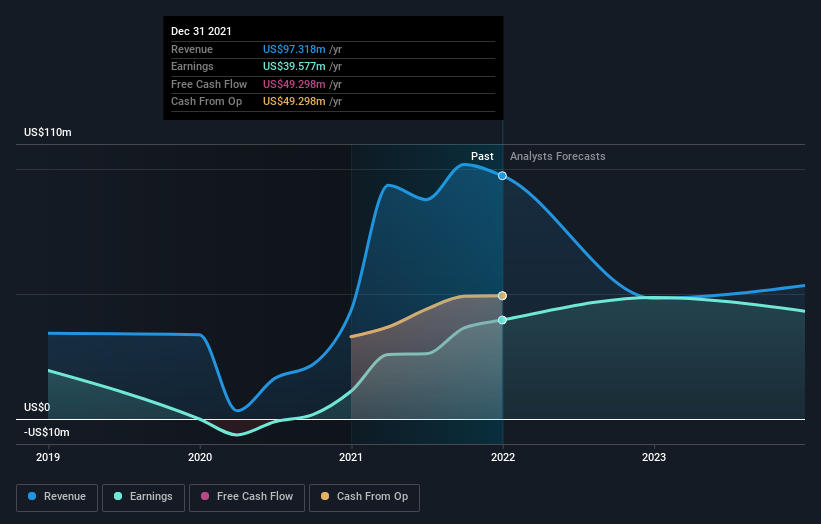[ad_1]
If you want to know who really controls NexPoint Real Estate Finance, Inc. (NYSE:NREF), then you’ll have to look at the makeup of its share registry. Large companies usually have institutions as shareholders, and we usually see insiders owning shares in smaller companies. Companies that have been privatized tend to have low insider ownership.
NexPoint Real Estate Finance is a smaller company with a market capitalization of US$346m, so it may still be flying under the radar of many institutional investors. Our analysis of the ownership of the company, below, shows that institutions own shares in the company. Let’s take a closer look to see what the different types of shareholders can tell us about NexPoint Real Estate Finance.
Check out our latest analysis for NexPoint Real Estate Finance
What Does The Institutional Ownership Tell Us About NexPoint Real Estate Finance?
Institutional investors commonly compare their own returns to the returns of a commonly followed index. So they generally do consider buying larger companies that are included in the relevant benchmark index.
NexPoint Real Estate Finance already has institutions on the share registry. Indeed, they own a respectable stake in the company. This can indicate that the company has a certain degree of credibility in the investment community. However, it is best to be wary of relying on the supposed validation that comes with institutional investors. They too, get it wrong sometimes. When multiple institutions own a stock, there’s always a risk that they are in a ‘crowded trade’. When such a trade goes wrong, multiple parties may compete to sell stock fast. This risk is higher in a company without a history of growth. You can see NexPoint Real Estate Finance’s historic earnings and revenue below, but keep in mind there’s always more to the story.
It looks like hedge funds own 38% of NexPoint Real Estate Finance shares. That’s interesting, because hedge funds can be quite active and activist. Many look for medium term catalysts that will drive the share price higher. The company’s largest shareholder is Highland Capital Management, L.P., with ownership of 38%. Meanwhile, the second and third largest shareholders, hold 5.2% and 2.5%, of the shares outstanding, respectively. In addition, we found that James Dondero, the CEO has 1.4% of the shares allocated to their name.
Our research also brought to light the fact that roughly 50% of the company is controlled by the top 5 shareholders suggesting that these owners wield significant influence on the business.
While studying institutional ownership for a company can add value to your research, it is also a good practice to research analyst recommendations to get a deeper understand of a stock’s expected performance. There is a little analyst coverage of the stock, but not much. So there is room for it to gain more coverage.
Insider Ownership Of NexPoint Real Estate Finance
The definition of an insider can differ slightly between different countries, but members of the board of directors always count. The company management answer to the board and the latter should represent the interests of shareholders. Notably, sometimes top-level managers are on the board themselves.
I generally consider insider ownership to be a good thing. However, on some occasions it makes it more difficult for other shareholders to hold the board accountable for decisions.
We can report that insiders do own shares in NexPoint Real Estate Finance, Inc.. It has a market capitalization of just US$346m, and insiders have US$14m worth of shares, in their own names. It is good to see some investment by insiders, but it might be worth checking if those insiders have been buying.
General Public Ownership
The general public– including retail investors — own 33% stake in the company, and hence can’t easily be ignored. While this group can’t necessarily call the shots, it can certainly have a real influence on how the company is run.
Next Steps:
While it is well worth considering the different groups that own a company, there are other factors that are even more important. To that end, you should learn about the 2 warning signs we’ve spotted with NexPoint Real Estate Finance (including 1 which is concerning) .
If you would prefer discover what analysts are predicting in terms of future growth, do not miss this free report on analyst forecasts.
NB: Figures in this article are calculated using data from the last twelve months, which refer to the 12-month period ending on the last date of the month the financial statement is dated. This may not be consistent with full year annual report figures.
Have feedback on this article? Concerned about the content? Get in touch with us directly. Alternatively, email editorial-team (at) simplywallst.com.
This article by Simply Wall St is general in nature. We provide commentary based on historical data and analyst forecasts only using an unbiased methodology and our articles are not intended to be financial advice. It does not constitute a recommendation to buy or sell any stock, and does not take account of your objectives, or your financial situation. We aim to bring you long-term focused analysis driven by fundamental data. Note that our analysis may not factor in the latest price-sensitive company announcements or qualitative material. Simply Wall St has no position in any stocks mentioned.
[ad_2]
Source link






More Stories
Molina pivots to permanent remote work, plans to cut real estate footprint by two-thirds
A Successful Return for embedded world
Molina to cut two-thirds of leased real estate footprint